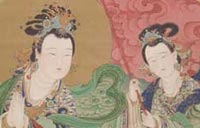|
Cheng Xiaochun (left) gets great enjoyment from making rice-paper tools even though he doesn't make much money from it. |
 |
| Buddhist paintings |
 |
| Shaolin kung fu staged in Israel |
Cheng is devoted to his family business that traces back to the Qing Dynasty (1644-1911). He will trek long distances every year for the lacquer essential to zhi lian, the mold for the paper. He will paint, drill holes and work on hair-thin bamboo splits days on end. Proper rice-paper done in his way is smooth like "a woman's skin". (The quaint paper-making process can be seen in the documentary film A Piece of Traditional Rice Paper.)
Seeing such a piece of paper gives him satisfaction, though not much money.
He enjoys a fully bucolic life, has a taste for seasonal wild herbs, raises hens and dogs in the garden and practices tai chi. Among his friends are local legendary kung fu masters, who would single-handedly take down a dozen or more opponents.
"The work, as with every other intangible art, requires full attentiveness. It's repetitive and taxing," Liang says. "That makes simple daily leisure so much more enjoyable."
Moreover, Cheng has inherited the state of mind from years of the master-and-apprentice kind of education unique to folk arts.
"When you stay with a shifu (master) so closely, they don't just watch your technique, they also make sure that you are a man of integrity," Jiao explains. "It's your character that makes or breaks your career."
Cheng lists some of the trade's protocols. "One should never sell the product at a discount. One should never sit when your master is standing. One should never reach for a third piece of meat."
And that slowly makes them the respectable craftspeople who love their trade and have no stomach for greed.
"If you really care for your art, you will avoid heavy drinking, gambling and all the excessiveness intuitively, because they undermine your judgment and skills," Liang says.
"And when you've experienced how the arts draw you in and have known how beautiful it is, nothing else gets to you," Jiao says.
"Distractions, like money and fame, don't exist."
|
|
|
|
|
|
|
|
